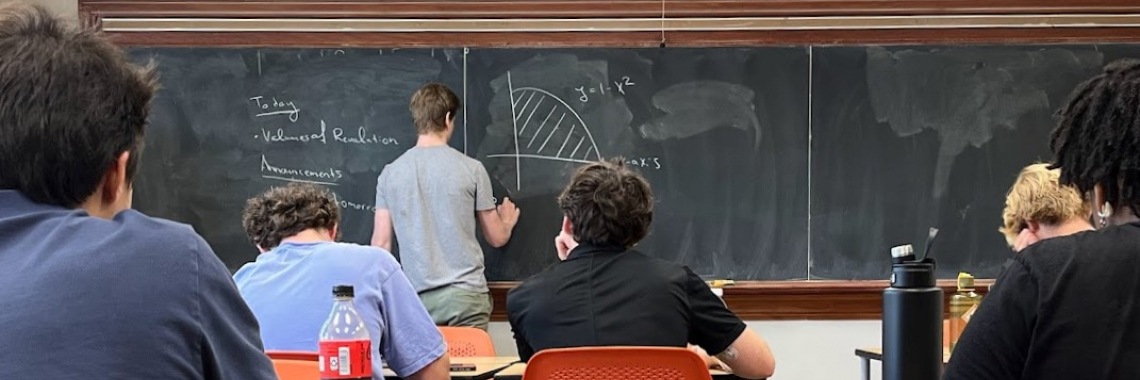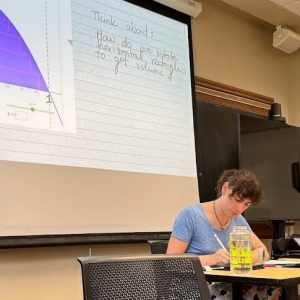Mathematicians Teach
Teaching is an important and enriching component of academic scholarship. Learning to teach is a valued component in the education of our mathematics graduate students and being part of an instructional team is a critical part of both their professional development and financial support. In our program students will learn, observe, and practice; they will teach with support, teach with others, and then teach alone. Throughout this process students are guided by classes, observations, feedback, and professional development that supports their growth.
Goals of the Instructional Training program:
- Provide graduate students with pedagogical knowledge and practical experience and skills as educators.
- Prepare and support graduate students to teach undergraduates during their graduate school career.
- Support a culture of teaching in the Math department by inspiring graduate students to implement evidence-based teaching strategies, build active learning into their lesson plans, and foster inclusive learning environments.
Timeline
Training Week
Before the start of their first semester, graduate students participate in Training Week, a program that includes new and returning members of the Math department. As new graduate students meet those in their cohort and program, they learn about resources available at Duke and within the department. The week includes sessions on effective and inclusive teaching practices, DEI training, grading, professionalism, as well as orientation sessions led by the Graduate School. In addition, graduate students who are teaching in the fall attend sessions on teaching to review and reinforce best practices. Some sessions are exclusively for new teachers, while others integrate both new and experienced graduate students. Graduate students have opportunities to share ideas with faculty as well as with each other. A sample schedule of Training week is here.
First Year Graduate Seminar (FYGS)
In their first semester, graduate students attend FYGS each week, led by the Director of Graduate Studies and a Professor of the Practice. The goal of this seminar is to acclimate students to the Duke Math community and to begin their teacher training through observation and reflection of Lab Calculus classes and the Help Room. Students reflect on their observations and discuss this and their own experiences with teaching. Other activities include attending research seminars and creating a professional development plan for their time at Duke. Math department members and other campus personnel will be guest speakers.
Pedagogy courses and Teaching Assistantships
In their second semester, graduate students will complete the first (772S) of two pedagogy courses led by Math faculty. Math 772S will introduce students to evidence-based, equitable, student-centered and effective teaching practices. During this course students will:
- Present short lessons to their peers and receive feedback.
- Engage in critical self-reflection of their development as an educator while concurrently working as Teaching Assistants (TAs) in the Lab Calculus help room.
- Be observed in the help room and given feedback.
In their third semester, students will complete their second pedagogy course (773S), which focuses on their development as an instructor. During this course students will:
- Learn to develop lesson plans, write and grade assessments, learn about class logistics and campus resources, and address common teaching scenarios.
- Lead a Calculus Lab as a TA, paired with an undergraduate TA. This involves preparing reviews of lectures, facilitating group work, responding to and asking questions, and grading assessments. Students are observed and given feedback about their teaching.
- Continue to engage in teaching and self-reflection. Students will be observed by the Teaching Coordinator and the instructor, be given feedback, reflect on their performance, and write SMART goals for growth.
Teaching as a TA, Discussion Leader, or Instructor of Record
In their second and each following years, graduate students hold an instructional role as either a TA, a Discussion Leader of a 200+ math course, or an Instructor of Record. Course coordinators in the calculus sequence meet weekly with their instructional team as part of continued mentorship and support. The Teaching Coordinator observes each graduate student twice during a semester, recording the lecture and providing feedback. Students and the TC meet to write SMART goals for growth. Midterm and end-of-term feedback from undergraduates is solicited and shared and discussed as well.
Graduate Teacher Training Program Handbook
Role of Teaching Coordinator
The Teaching Coordinator (TC) supports the graduate students with their professional development as it relates to teaching. The TC works closely with the Professors of the Practice to coordinate and administer the observation of every graduate student instructor, discussion leader, or TA twice each semester. The TC analyzes evaluations and meets one-on-one with each student to discuss strengths and challenges and create SMART goals. The DGS, POPs, and mentors/advisors are kept apprised of any situations that need support.
The TC also manages the department midterm feedback program, which solicits feedback from undergrads midway through the semester about their courses, with a focus on courses that involve graduate students in instructional roles. This involves administering in-person feedback sessions for lab calculus and other math courses, creating and reviewing department midterm survey reports, and meeting with instructors to share feedback. The TC also analyzes semester-end TCEs and shares with students and their advisors. Each graduate student has a Duke Box teaching folder that stores their observation feedback, videos, midterm feedback and TCEs, which they can refer to when they apply for positions that involve teaching.
Teaching Resources
Duke Math Intranet > Grad Student Instructional Program (internal site)


